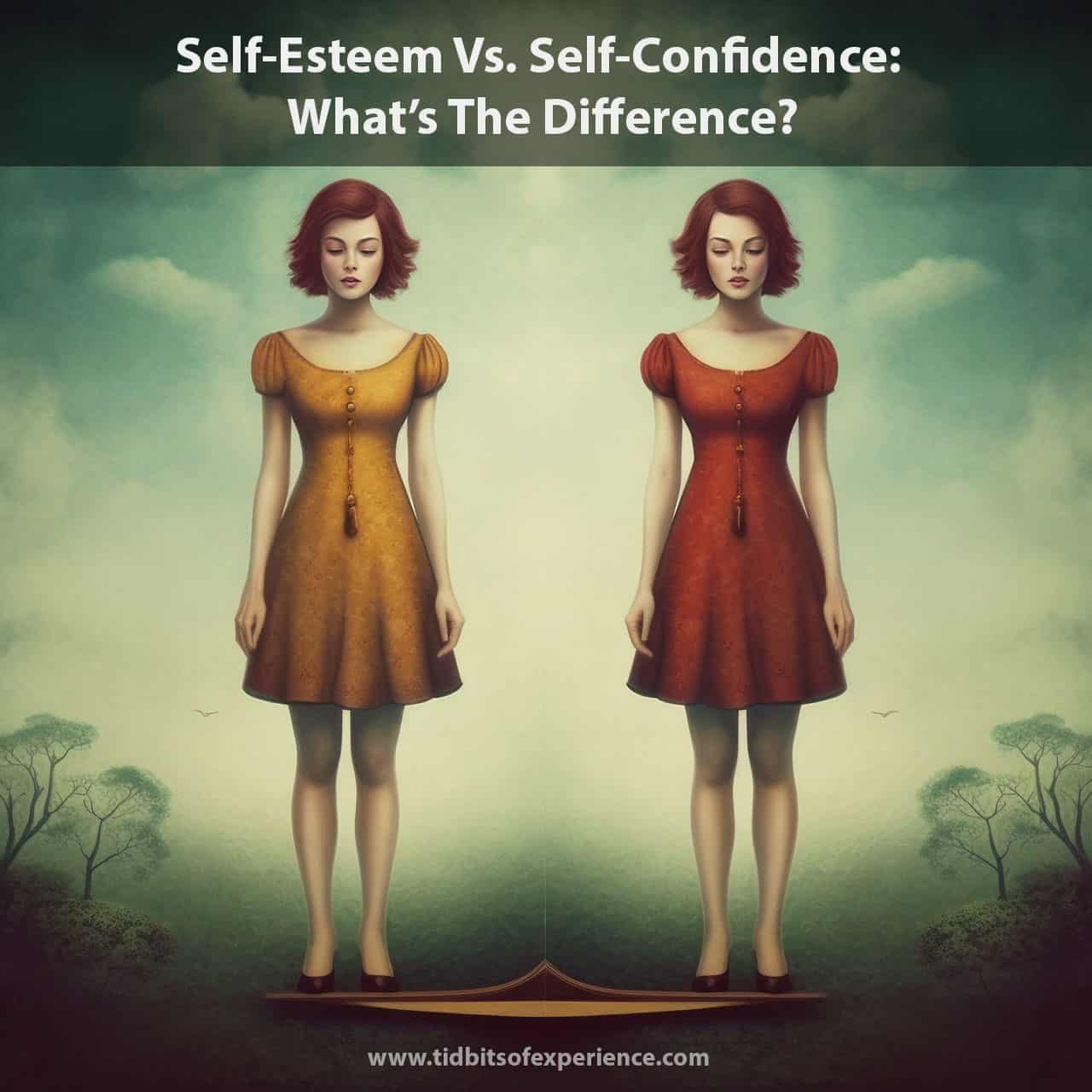Have you ever wondered what the difference is between self-esteem and self-confidence? While these terms are often used interchangeably, they hold distinct meanings that are crucial to our overall well-being.
In this blog post, we will explore the differences between self-esteem, which relates to our sense of self-worth and self-respect, and self-confidence, which focuses on our belief in our abilities.
As you read on, not only will you gain a deeper understanding of these two important concepts, but you will also learn practical strategies for boosting both your self-esteem and self-confidence.
Self-Esteem Vs. Self-Confidence (Key Takeaways)
- Self-esteem refers to our sense of self-worth and self-respect, while self-confidence is about our belief in our abilities.
- Low levels of both can negatively impact decision-making and relationships, but boosting both can lead to better mental health outcomes and increased happiness.
- Boosting self-esteem involves challenging negative thoughts, practicing self-compassion, setting achievable goals, and prioritizing self-care.
- Boosting self-confidence entails taking small steps towards goals, practicing positive self-talk, surrounding oneself with supportive people, preparing for challenges, and embracing failure as a learning opportunity.
Table of Contents
Defining Self-Esteem Vs Self-Confidence

Self-confidence refers to a person’s belief in their abilities, while self-esteem relates to their overall sense of self-worth and self-respect.
Understanding The Difference Between The Two
Understanding the difference between self-esteem and self-confidence is essential in our journey toward personal growth and fulfilling relationships. Self-esteem is an internal evaluation of our worth, which refers to how much we like and accept ourselves.
It involves acknowledging our strengths and weaknesses while maintaining a positive self-image despite flaws or imperfections. On the other hand, self-confidence is about having faith in our abilities to handle various situations competently.
For example, a woman with healthy self-esteem may recognize her skills as an excellent communicator with a caring nature but also accept that she’s not particularly skilled at sports or managing finances.
She embraces these qualities without judgment, understanding that no one is perfect. In contrast, if this same woman possesses high self-confidence as well, she trusts her ability to learn new things—like taking on a challenging workout routine or learning how to budget effectively—and strives for improvement while remaining assured in her capabilities throughout the process.
Signs Of Low Self-esteem And Self-confidence
It’s essential to recognize the signs of low self-esteem and self-confidence to address them effectively. The following list highlights common indicators that you may be struggling with these issues:
- Constantly seeking approval from others
- Difficulty accepting compliments or praise
- Fear of failure, leading to avoidance of new challenges
- Experiencing feelings of worthlessness or incompetence
- Negative thinking patterns, such as focusing on past mistakes or flaws
- Feelings of insecurity in relationships, often resulting in jealousy and possessiveness
- Difficulty asserting yourself or expressing your needs and desires
- Perfectionism that leads to procrastination and feelings of inadequacy
- Engaging in self-destructive behaviors, like emotional eating or substance abuse
- Social withdrawal and isolation due to fear of rejection
Understanding these signs can help you identify areas for improvement and take steps toward boosting your self-esteem and self-confidence, ultimately leading to a happier, healthier life.
The Importance Of Healthy Self-Esteem And Self-Confidence

Healthy self-esteem and self-confidence can positively impact every aspect of your life, leading to better relationships, improved decision-making skills, and greater mental and emotional well-being.
Positive Impact On Relationships And Decision-making
A strong sense of self-esteem and self-confidence can work wonders on your relationships and decision-making abilities. You can navigate life with greater emotional intelligence when you truly understand your worth and believe in your capabilities.
In addition to boosting relationship satisfaction, having high self-esteem directly influences your decision-making skills. Since confident individuals trust their judgment and aren’t easily swayed by others’ opinions, they make decisions that align closely with their values and aspirations.
This leads to increased productivity at work, better goal-setting habits, and ultimately happier lives. A prime example is the ability to say “no” when necessary – if faced with a situation that goes against one’s principles or priorities, women with strong self-esteem will stand up for themselves confidently without fear of backlash or judgment from others.
Improved Mental And Emotional Health
Having healthy levels of self-esteem and self-confidence can significantly improve our mental and emotional well-being. When we have a positive view of ourselves, we are less likely to experience negative thoughts, feelings of anxiousness, or depression.
The latest clinical research on depression shows that low self-esteem is associated with higher rates of anxiety and depression.
Furthermore, when we have strong self-worth, it’s easier for us to form secure connections with others. For instance, if we don’t like ourselves very much or believe that no one will ever accept us the way we are, this often prevents us from connecting deeply with those around us.
Boosting Self-Esteem

Challenge negative self-talk by identifying unhelpful thought patterns and replacing them with positive affirmations focusing on personal strengths and achievements.
Identifying And Challenging Negative Self-talk
Identifying and challenging negative self-talk is important in boosting your self-esteem and self-confidence. Here are some tips to help you do it:
- Notice when you’re being self-critical: Pay attention to the thoughts that go through your head when you’re feeling down. Are they kind and compassionate, or are they harsh and judgmental?
- Challenge negative thoughts: Once you’ve identified a negative thought, challenge it by asking yourself if it’s true. Often, these thoughts are based on assumptions or beliefs that aren’t grounded in reality.
- Reframe negative thoughts: Instead of dwelling on what you did wrong, try to focus on what you did right or what you can learn from the experience.
- Practice self-compassion: Treat yourself with kindness and understanding, just as you would a good friend who was struggling.
- Surround yourself with positive people: Spend time with people who uplift and encourage you rather than those who bring you down.
- Seek professional help if negative self-talk affects your quality of life: consider seeking guidance from mental health counseling.
By learning to identify and challenge negative self-talk, you can begin to build a healthier relationship with yourself and boost your overall sense of well-being.
Practicing Self-compassion And Celebrating Strengths
Practicing self-compassion and celebrating strengths is essential in building healthy self-esteem and confidence. We often spend too much time focusing on our flaws and mistakes, leaving little room for acknowledging our achievements and qualities.
Being kinder to ourselves can boost our emotional well-being, which is crucial for achieving personal growth. Practicing self-compassion begins with acknowledging that it’s okay to make mistakes and that we should treat ourselves like good friends.
For instance, if you’re an excellent problem-solver at work or have raised children who are thriving adults today, these accomplishments deserve recognition.
Setting Achievable Goals And Prioritizing Self-care
Setting achievable goals and prioritizing self-care are crucial steps in building both self-esteem and self-confidence. Studies have shown that setting realistic objectives can increase motivation, autonomy, and overall well-being.
Additionally, regular self-care activities such as exercise, meditation, or spending time with loved ones can significantly enhance mental health outcomes.
A national survey of Americans found that incorporating self-care practices into daily routines increased productivity, decreased stress levels, and improved overall happiness.
Boosting Self-Confidence
To boost your self-confidence, take small steps towards your goals, practice positive self-talk, surround yourself with supportive people while preparing for challenges, and embrace failure as a learning opportunity.
Taking Small Steps Towards Goals And Practicing Positive Self-talk
Improving your self-esteem and self-confidence starts with taking small steps toward your goals and practicing positive self-talk. Here are some tips:
- Break down your goals into smaller, more manageable tasks
- Celebrate each achievement, no matter how small
- Focus on what you can control and let go of what you cannot
- Surround yourself with people who uplift and support you
- Practice mindfulness and gratitude to stay present in the moment
- Use affirmations or positive statements to counteract negative self-talk
- Visualize yourself succeeding and achieving your goals
- Learn from setbacks and failures as opportunities for growth
By taking these small steps towards your goals and practicing positive self-talk, you can boost both your self-esteem and self-confidence, leading to greater well-being and life satisfaction.
Surrounding Yourself With Supportive People And Preparing For Challenges
Having a supportive network of people who believe in you and uplift you can significantly boost your self-confidence. Surrounding yourself with people who encourage and inspire you rather than criticize or bring you down can help build your confidence and resilience.
However, it’s also crucial to prepare for challenges that may come up on your journey toward building self-confidence. This means being aware of potential obstacles and planning to overcome them.
For example, if public speaking makes you nervous but is necessary for achieving a personal or professional goal, practice beforehand by rehearsing in front of a small group or seeking out public speaking courses.
Embracing Failure As A Learning Opportunity
It’s easy to feel down on ourselves when we experience failure, but it’s important to remember that failure can actually be a valuable learning opportunity. Instead of letting mistakes bring us down, we should use them as an opportunity to grow and improve.
For example, if you fail a test or project at work, take the time to reflect on what went wrong and how you can do better next time.
By embracing failure as a learning opportunity instead of dwelling on our mistakes, we build resilience and become more confident in our abilities. It takes practice and self-compassion to shift our mindset from negative self-talk during moments of perceived failure to see it as an opportunity for growth.
Finding The Balance Between Self-Esteem Vs Self-Confidence

Recognize that self-esteem and self-confidence work together to complement each other, and focus on building both simultaneously through positive self-talk, surrounding yourself with supportive people, and embracing failure as a learning opportunity.
Recognizing How They Work Together And Complement Each Other
Self-esteem and self-confidence are interconnected. While self-esteem is the overall feeling of self-worth, self-confidence is more about believing in one’s abilities to achieve a particular goal or task.
For example, if you have high self-esteem but low confidence in your ability to do public speaking, you may still avoid it due to fear of failure or rejection. On the other hand, if you have high confidence but low self-esteem, you may feel unworthy of praise even when achieving something great.
Building Both Simultaneously
Building self-esteem and self-confidence simultaneously requires balancing acknowledging your limitations and challenging yourself to grow and improve.
It’s important to recognize that building these traits takes time and effort, but it is possible with consistent practice. One effective approach is to identify your strengths and actively work towards improving them while also embracing failure as an opportunity for growth.
Surrounding yourself with supportive people who uplift you can also help boost both aspects of your identity by providing encouragement when needed. And lastly, prioritize self-care and make time for activities that bring you joy or peace of mind, like reading a book or walking in nature.
Frequently Asked Questions (About Self-Esteem Vs. Self-Confidence)
What is the difference between self-esteem and self-confidence?
Self-esteem refers to how you value and perceive yourself, while self-confidence relates to your belief in your abilities to accomplish goals or handle challenges. While related, these two concepts are distinct from each other.
How can I boost my self-esteem?
There are many ways to boost your self-esteem, such as practicing positive self-talk, surrounding yourself with supportive people, setting achievable goals, and celebrating accomplishments no matter how small they may be.
Can low self-esteem impact overall mental health?
Yes, having low-self esteem can lead to negative thought patterns that can cause anxiety and depression over time if left untreated. It’s important to address any issues with low-self esteem early on for better mental health outcomes.
Are there any techniques I can use to improve my self-confidence?
Yes! Techniques such as visualization exercises and affirmations, taking action despite fear or doubt, and focusing on past successes instead of failures can all help increase feelings of confidence over time.
Conclusion: Boosting Your Self-Esteem And Self-Confidence
Understanding the difference between self-esteem and self-confidence is important, as they both play a crucial role in our overall well-being. Low levels of either can negatively impact our ability to make decisions and maintain healthy relationships.
Boosting your self-esteem involves identifying negative thought patterns, practicing self-compassion, setting achievable goals, and prioritizing self-care. On the other hand, boosting your self-confidence entails taking small steps toward your goals, surrounding yourself with supportive people, embracing failure as a learning opportunity, and practicing positive self-talk.
